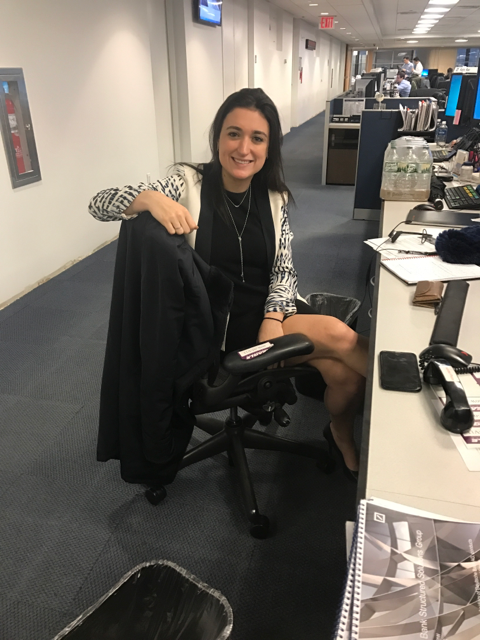The world of financial services is broader than you might realize – and your degree subject isn’t the most important factor when considering a career in finance. Take Abigail Carras, for example. She graduated with an Industrial Engineering degree from Columbia University and now works at Deutsche Bank, a leading global bank. Originally unsure of her long-term career path, she found her way through the bank’s rotational analyst program.
We got to hear more about how Abigail gained a comprehensive overview of the industry, built her personal network across different divisions and found a role that best fit her work style and skill set. Read on to hear her story.

Tell us a bit about your background and why you chose to work at Deutsche Bank?
Abigail Carras: After spending two summers in internship programs – one at a hedge fund and one at a State Department – I wanted to find a full-time role where I could merge those two sets of interests. I have a quantitative background but I’m also stimulated by learning about the world around me, and I like to interact with people.
Knowing that I wanted to build a strong foundation in finance, I started looking for a structured training program at a bulge bracket bank. While the summer internship program is a more typical path, I instead joined Deutsche Bank through the full-time recruiting program. I really connected with the people I met while interviewing and rotating through placements with several different teams helped me realize Global Markets was the best fit for me.
What do you do in your position and what is your division’s role within the larger business?
AC: I work in Deutsche Bank’s Global Markets division, which is our Sales and Trading business. My team is responsible for originating structured finance transactions for the bank. This means I speak with institutional investors to understand their strategic needs – things like higher returns, increased flexibility, or other tactical challenges – and help solve those problems.
What is something about your role and department that students may not know about?
AC: My role at the bank is a great example of the benefits of Deutsche Bank’s full-time rotational program. Since my position is not the typical role you would associate with Sales and Trading – for example, I am not trading equities or selling bonds – I probably wouldn’t have known to apply to this team right out of college. Instead, I realized I enjoyed the problem solving-oriented work in this seat once I was able to spend a month rotating with the team.
I work on a diverse range of unique transactions – from financing aircraft leases to securitizing auto loans to selling construction loans for solar panels. I feel like I’m constantly learning new things and getting exposure to different industries; it’s incredibly exciting.
What is the most rewarding part of your role and why?
AC: The transactions I work on can take many months to complete, and there are many points along that timeline when things can go wrong; the feeling of overcoming those challenges successfully is incredibly rewarding.
How do you feel your work gives you a sense of purpose?
AC: Having interned in other industries before deciding on a career in finance, I feel more of a sense of purpose in this role than anywhere else, and for me that comes down to the people. I work in a collaborative environment with colleagues who are incredibly intelligent and hard working. For me, it was important to find a job where I could discuss interesting issues and surround myself with people who pushed me to be the best I could be. That’s what I found at Deutsche Bank.
If someone was interested in pursuing the same role you currently have, what would be your advice to them?
AC: There are three things I’d advise:
1. Don’t be afraid to start networking and building your personal brand early-on! I spent my freshman and sophomore years of college going to all sorts of career information sessions on campus. Even if you are not applying for the internships yet, you will get to meet helpful people who can guide you. Networking not only helps increase your opportunities, but also helps you learn about yourself; hearing about others’ experiences can help you understand what you want out of your own future.
2. To stand out amongst your peers, it’s important to seek out opportunities that show you are genuinely interested in this industry. Internships are not the only way to do this; for example, consider participating in a stock pitch competition a club at your school is holding, or assisting a professor who needs help with their research.
3. The most successful people in a role like mine are those who have a perpetual hunger to learn about new things and a drive to chase opportunities. While you will need both quantitative acumen and strong communication skills in many of roles available in finance, it is really the hard workers and go-getters who I have found to be the most successful.
Does Deutsche Bank sound a place where you can make your mark? Head over to their company page on WayUp to learn more!





